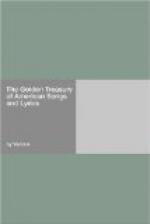Thalatta.—Regarding this poem, Thomas Wentworth Higginson says, in “The New World and the New Book:” “Who knows but that, when all else of American literature has vanished in forgetfulness, some single little masterpiece like this may remain to show the high-water mark, not merely of a single poet, but of a nation and a generation?” The author of “Thalatta” was a Dartmouth graduate, a teacher, and a disciple of Emerson.
The Fall of the Leaf.—Thoreau’s prose is known universally; his verse has not won as yet the recognition it deserves. It has little lyrical quality, but for unconventionality, charming turns of phrase, and the intimate knowledge of Nature it reveals, it is almost alone in American poetry.
The Rhodora.—“The Rhodora” has a conciseness and unity too rare in Emerson’s poetry, which, beautiful in details, is strangely uneven. We sigh as we think what an unrivalled lyric poet Emerson would have been had he been sustained at the heights he was capable of reaching. No one surpasses Emerson at his best; he is almost a great poet.
The Chambered Nautilus.—Many think this Holmes’s finest poem. It is taken from “The Autocrat of the Breakfast Table,” 1858.
Thought.—Helen Jackson is, perhaps, the most gifted of American women poets. Emily Dickinson is more imaginative, but her utter scorn of form in composition makes her work, unique as it is, less satisfying. Mrs. Jackson was a favorite with Emerson, and he is said to have liked best among her poems this sonnet, “Thought.”
On a Bust of Dante.—Parsons, one of the best of American poets, is one of the most neglected. Stedman is inclined to think “On a Bust of Dante” the finest of American lyrics (see “The Nature of Poetry,” 254).
The Port of Skips.—In a recent review of American Literature in the London Athaeneum occurs this sentence: “In point of power, workmanship, and feeling, among all poems written by Americans, we are inclined to give first place to the ‘Port of Ships,’ of Joaquin Miller.”
Evening Song.—No poem of Lanier is more free from his characteristic faults. One regrets that so much of his work, highly imaginative as it is, is marred by over-elaboration and artificiality.
A Woman’s Thought.—The striking reality and directness of this lyric, its immense emotional undercurrent, and its abrupt, almost gasping metre, admirably suited to the impassioned mood of the speaker,—these are a few of the qualities that combine to make “A Woman’s Thought” one of the most remarkable poems in the book.
The White Jessamine.—One of the most charming of Father Tabb’s lyrics. The verse of this poet is uneven in merit. He is too prone to merely fanciful conceits. But at his best Tabb is imaginative, as, for example, in the lines where he says of Angelo that he—
“From the sterile womb of stone,
Raised children unto God.”




